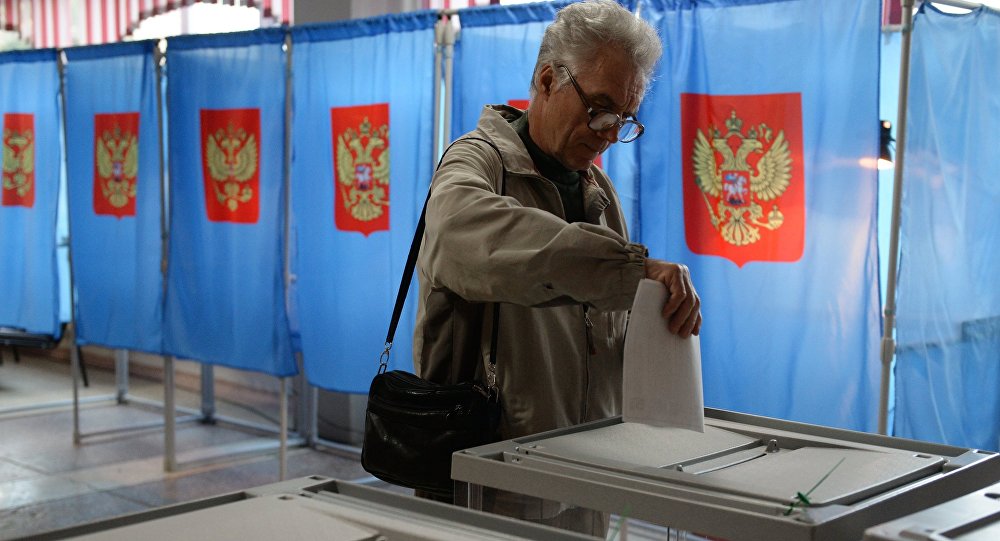
This month, Russian voters went to the polls to elect their president for a six-year term. To no one’s surprise, results confirm the incumbent president, Vladimir Putin, prevailed yet again.
Initial reports gave him as much as 76 percent, and 56.2 million votes – the highest number cast for a single candidate since 2004. Putin ran against seven minor opponents, including opposition candidates; some brazenly systemic and some more critical of the incumbent. Regardless, all did poorly. In the months before March 18, opposition leaders failed to reach an agreement on how to approach the election. Faced with the lack of clear leadership, guidance on strategy, and choice altogether, some of their supporters answered a call to boycott the election. Others went to the polls and either destroyed their ballot or decided between Grigoriy Yavlinsky (Yabloko) and Ksenya Sobchak (Civic Initiative).
The Kremlin-controlled Central Election Commission (CEC) barred Alexei Navalny, a popular democrat, corruption fighter and Putin’s number one foe, from running on made-up criminal charges back in December 2017. The impact of Navalny’s subsequent call for a boycott is difficult to estimate for the time being, especially given the abundance of voting fraud reported by election observers. It did, however, provide an excellent excuse for the government to crush his political movement, including multiple arrests of his aides and supporters throughout the campaign. In sum, the strategy of boycotting the election can be considered a failure. The opposition managed to recruit tens of thousands of brave and dedicated election observers who successfully reported and prevented numerous instances of election fraud. That is the most encouraging conclusion that can be drawn from this election.
Authorities worked hard to drive voter turnout to the Kremlin-prescribed high-sixties, with widespread forced voting reported across the country. Opposition-affiliated and independent election observers claim the actual turnout fell 12 percent to 18 percent short of the officially announced numbers. Stuffing ballot boxes was ubiquitous. This, in addition to the intense pressure on Kremlin-dependent social groups to show up at the voting stations, and vote counting fraud, allowed the CEC to deliver on the turnout target imposed. The oldies but goodies of the election fraud spectrum were put into action as well, with groceries and household products offered at hugely discounted prices at voting stations in many regions, accompanied free lunches, gifts, and entertainment for children and adults.
Voters in Russia-annexed Crimea went to the polls for the first time since Russia had illegally taken over the peninsula exactly four years ago. Western governments reacted quickly. The President of Ukraine called the election a farce, and the Polish MFA called it illegitimate, as did Federal President of the Republic of Austria Alexander Van der Bellen on behalf of the Austrian government. During a joint press conference with his Ukrainian counterpart, he said, “legitimate elections to the Russian Parliament and the elections of Russian President cannot take place in Crimea.”
The FIFA World Cup will be held in Russia this summer. Russia’s international reputation is currently at a low, due to a long list of developments: the annexation of Crimea, the war in Donbass, military intervention in Syria, the doping scandal and subsequent ban on Russian athletes in the 2018 Olympics, multiple government officials’ corruption brought to light by Alexei Navalny, a diplomatic scandal over an alleged assassination attempt of Sergei Skripal in Salisbury. The pretense of fairness and freedom we are witnessing will not keep at bay the overwhelming impression that something is rotten in the Russian state. We have yet to see how the Russian authorities intend to save the country’s image abroad in the face of calls to boycott official World Cup voiced recently by Western politicians. President Putin’s strength at home seems to be inversely proportional to his popularity abroad, and according to a vast majority of indices (press freedom, corruption, military spending, but, first and foremost, economy-related), Russia is much less of a superpower than it purports to be. Sadly, some in the West take the blame for inflating Putin’s virtues at home and abroad.
The democratic opposition in Russia needs to thoroughly analyze their strategy, seek what unites them, and work from the bottom up. Their success during the last municipal election in Moscow showed that the demand for politicians not affiliated with the Kremlin does exist, and can translate into votes, at least on the local government level. In the eyes of most of his people, Vladimir Putin had his strong support reaffirmed, which may now lead to him seeking an even stronger his grip on power. Therefore, the opposition needs to stay strong and united to counter that. Their first test will be the Moscow mayoral election in September of this year, followed by 2019 Moscow City Duma election, and 2019 municipal election in Sankt Petersburg.
Top